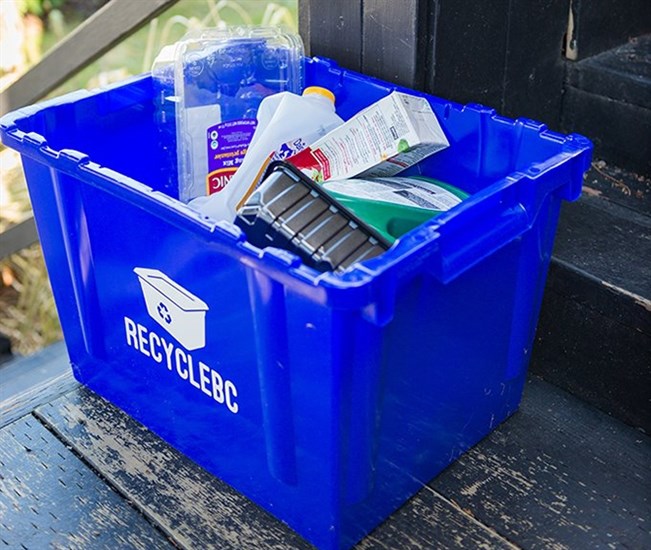
Despite reports from other jurisdictions, B.C.'s recycling industry is alive and well, thanks to the province's unique-to-North America recycling program.
Image Credit: SUBMITTED/ Recycle BC
May 08, 2019 - 4:30 PM
The global recycling industry has fallen on hard times, but it continues to be business as usual for residential recyclers in Kamloops and the Okanagan.
That’s because of British Columbia’s recycling methods, which are unique to North America.
Recycle B.C. public affairs director David LeFebvre says British Columbia is weathering the current downturn in the global recycling market well because of its adoption of “full producer responsibility” for recycling of packaging.
“Our story is very different from other jurisdictions in North America,” LeFebvre says.
Recent national reports of a crumbling recycling industry brought on by the closure of markets in China and other countries has created some confusion amongst residents in the Thompson and Okanagan who may be thinking their programs are in jeopardy.
“We still have end markets for all materials collected by Recycle B.C. China used to accept the majority of paper, but that is now sent to India, B.C. and elsewhere in North America,” he says.
LeFebvre says the message can be confusing with so many stories in the media about other jurisdictions that are struggling to find markets for recycled materials, or who are quitting recycling altogether.
Recycle B.C. took a province-wide approach to recycling of residential household plastic and paper packaging products when it began five years ago. The non-profit organization funds and manages the recycling system in the province on behalf of the manufacturers that produce the packaging, who also pay for the costs of the program.
LeFebvre says the province-wide approach means a large volume of uniform, high quality recyclable products can be collected, providing Recycle B.C. with an opportunity to focus on contamination.
As a result, in times like these, B.C.’s recyclables can still find a market when recycling processors become choosey.
Le Febvre says Recycle B.C.’s program is the only program in North America that is funded and operated by the companies that put the packaging into the marketplace, although similar versions exist in Europe.
Merlin Plastics of Vancouver takes all of the province’s recycled plastic, a business opportunity that was created when Recycle B.C. began province-wide collection.
Recycled glass goes to Abbotsford for processing into new bottles, and rejected glass goes to Quesnel to be made into sandblasting materials.
Scrap metal is turned into cans and sheet metal in B.C. and Ontario, and paper is sold to U.S., B.C. and overseas markets for remanufacture into egg cartons, boxes and similar products.
On a local level, Thompson Nicola Regional District Environmental Services Manager Jamie Vieira says the world recyclables market has affected how much and what type of recycling can be taken from the district’s industrial, commercial and institutional sector. The regional district board has given the go-ahead to amend the district’s Recycle B.C. agreement to begin accepting materials from industrial, commercial and institutional sectors, but Vieira says that move will come at additional cost to taxpayers.
In the Regional District of North Okanagan, communications officer Ashley Gregerson says changes had to be made to the district’s recycling service due to world markets because the district doesn’t provide curbside recycling, which is run by Recycle B.C.
The district was forced to discontinue recycling drop centres at landfills because its contractor could no longer accept material as of Jan. 1, 2019, due to restrictions placed on them by the world’s largest recycling commodity purchasers. The changes affect the regional district’s residents using blue bag recycling drop centres at North Okanagan Regional District diversion and disposal facilities.
Central Okanagan Regional District corporate communications manager Jodie Foster says the curbside collection program is partnered with Recycle B.C., with no changes to the recycling program.
Regional District of Okanagan Similkameen solid waste coordinator Cameron Baughen said residential recycling in the district is also coordinated with Recycle B.C., who pay the regional district a flat fee to collect materials. He called the system “incredibly efficient.”
To contact a reporter for this story, email Steve Arstad or call 250-488-3065 or email the editor. You can also submit photos, videos or news tips to the newsroom and be entered to win a monthly prize draw.
We welcome your comments and opinions on our stories but play nice. We won't censor or delete comments unless they contain off-topic statements or links, unnecessary vulgarity, false facts, spam or obviously fake profiles. If you have any concerns about what you see in comments, email the editor in the link above.
News from © iNFOnews, 2019